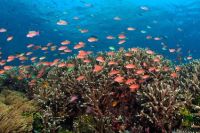World Ocean Conference or Coral Triangle Initiative Summit Brings Together Asia Pacific Countries
The World Ocean Conference, also known as the Coral Triangle Initiative (CTI) Summit was presided over by the Indonesian President Susilo Bambang Yudhoyono, and attended by his five counterparts.
They were President Gloria Arroyo from the Philippines, President Jose Ramos Horta from Timor Leste, Papua New Guinea's Prime Minister Michael Somare, the Solomon Island's Prime Minister Derek Sikua and Prime Minister of Malaysia Najib Razak.
 World Ocean Conference - Coral Triangle Initiative |
The summit was also aimed to call attention to the importance of oceans. At the Earth Summit in Rio de Janeiro, Brazil 17 years ago, world leaders signed landmark agreements to halt the loss of biodiversity, to safeguard the world's climate and to better manage the world's forests but they did not sign any agreement on oceans.
Following the agreement, Indonesia and its neighbors took some important actions together such as the tri-national agreement on the Sulu-Sulawesi Seas and the Bismarck-Solomon Seas, the Regional Plan of Action on Responsible Fisheries and within the framework of Asia Pacific Economic Cooperation (APEC), the Seoul Oceans Declaration and the Bali Ministerial Plan of Action on Oceans and Coasts.
"However, these efforts are not enough," Indonesian president said.
He also said that scientists warned them that their marine and coastal resources were being depleted by overfishing, destructive fishing practices, unsustainable coastal development, pollution and climate change.
That was why, he added, the leaders held the meeting to prevent the loss of the treasure and to enhance it for the next generation.
"We also invited partners to join us in the effort. The governments of the United States and Australia, the Asian Development Bank, the Global Environment Facility, Nature Conservancy, Conservation International and the World Wildlife Fund for Nature readily accepted this role," he said.
President Yudhoyono said that the six governments have achieved a new level of understanding.
First, they have formally recognized that the Coral Triangle was the very center of marine life abundance and diversity on the planet.
"Over 100 million of our citizens depend every day on these critical marine resources for their income, their livelihoods, their food security and the protection of their coast," he said.
Secondly, they recognized that threats to these precious marine and coastal resources were growing each day.
"These threats stem from climate change that is causing the sea level to rise and the sea surface temperature to increase. We must therefore adapt to these climate change impacts. We need a risk reduction strategy," the president said.
Thirdly, they identified that they ought to address these threats and reserve the trend of rising sea level and increasing sea surface temperature.
"Our six countries have therefore jointly developed a Regional Plan of Actions, the boldest and the most ambitious marine action plan ever agreed by governments. This will transform the way we manage our marine and coastal resources, and reshape our futures," he said.
On the part of Indonesia, and as demonstration or its commitment to the CTI Regional Plan of Action, the government was immediately taking vigorous measures.
"Immediately after this summit, I will sign a presidential decree creating a national committee of relevant minister to meet annually to advance the implementation of the CTI," he said.
The president announced that Indonesia formally established the Savu Sea National Marine Fisheries Sanctuary. The sea garden covers some 3.9 million hectares in the southern seas of Indonesia, bordering Timor-Leste.
"We have thus created some 13.5 million hectares of marine protected areas, considerably exceeding the target set some years ago of 10 million hectares of marine protected areas across Indonesia by 2010," he said.
The president also announced a new target, namely to achieve 20 million hectares of marine protected areas across Indonesia by 2010. Over the next three years, the Indonesian government will seek a doubling of the current national budget dedicated to specific programs and activities stipulated in the CTI Regional Plan of Action.
He also said that Indonesia offered to be the host of permanent CTI Secretariat to support the implementation of the action plan.
"If the other Coral Triangle countries accept this offer, we are prepared to provide full financial support for day-to-day operations of the secretariat," he said.
The president said that Indonesia was ready to pledge 5 million U.S. dollars for the CTI program.
The CTI summit was held as an effort to save coral reefs in the Coral Triangle to guarantee the livelihood of coastal people. Coral Triangle is a globally-recognized treasure containing marine life abundance and diversity.
[?] Subscribe To This Site |
| Share This Site | | Advertise | | Archive | | Privacy Policy |





